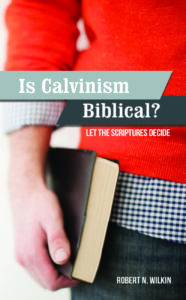
By Kathryn Wright
Calvinistic theology is gaining popularity among Evangelicals today. I have been involved with Southern Baptist churches for much of my life, and this theology is becoming increasingly prominent in the seminaries and pulpits. This especially seems to be the case with young pastors.
When people defend Calvinism, they often deal with it as a philosophical system. It is argued that the five points of Calvinism form a logical unit. In Is Calvinism Biblical? Wilkin does not look at Calvinism from the point of view of philosophical logic; rather, he asks whether or not the Bible supports it. The book is written so that the man or woman in the pew can read and understand it. However, the pastor will find it extremely helpful as well.
Wilkin addresses all five points of Calvinism. These five points are popularly known by the acronym TULIP. The letters stand for total depravity, unconditional election, limited atonement, irresistible grace, and perseverance of the saints. Wilkin says the last point can be—and has been—divided into two parts: the saints’ perseverance and the saints’ preservation (p. 15).
For each of the points, Wilkin discusses two Bible passages that prove the point to be unbiblical.
Concerning total depravity, Wilkin shows that in John 6:35, faith precedes the new birth. One does not receive eternal life and then acquire the ability to believe. Using the example of Cornelius in Acts 10, Wilkin demonstrates that an unbeliever can respond to the revelation of God (pp. 23-38).
Concerning unconditional election, Wilkin shows that the Jews in Acts 13:46 counted themselves unworthy of eternal life. God was not responsible for their unwillingness to believe. A similar thing can be said about the unbelieving Jews in John 5:39-40. Jesus said they were unwilling to come to Him (i.e., believe in Him). He did not say they were predestined to eternal condemnation (pp. 39-56).
John 1:29 clearly says that Christ died for the sins of the whole world. In 2 Peter 2:1, Peter says that the unbelieving false teachers were bought, or redeemed, by Christ (pp. 57-76). The two passages are a death knell for the view that Christ died only for people whom God elected to receive eternal life (the L of TULIP).
Regarding irresistible grace, Wilkin appeals to John 12:32 and Matt 23:37-39 to argue against it. In John 12, Jesus says that He will draw all men to Himself. In Matthew 23, it is clear that the unbelieving Nation of Israel (and the people in it) could resist the grace of God offered to it (pp. 77-96).
Using the Parable of the Four Soils in Luke 8 and the account of the woman at the well in John 4, Wilkin shows that believers cannot lose their eternal salvation. From Rev 20:11-15 and John 11:25-27, he points out that the reason people are cast into hell has nothing to do with their works. We find our assurance of salvation in the promise of Christ, not in our persevering in doing good (pp. 97-136).
Wilkin does an excellent job of getting to the heart of the matter regarding each point of Calvinism. He chooses verses that clearly and strongly argue against each point.
No doubt the Calvinist will question Wilkin’s exegesis. However, if Calvinism is considered a logical unit, then the whole system comes into question if one point fails.
For someone who is being drawn to Calvinism, the book could prove invaluable in guiding him to question whether the Bible really supports that theological system. Because Wilkin makes twelve separate strong arguments, it would be difficult to claim that he has misinterpreted all twelve.
The book ends with two helpful appendices. The first deals with the ways Calvinists reply to the twelve verses Wilkin discusses (pp. 137-57). This is important because often, when we read verses that oppose a particular theological view, we wonder how those who hold that view would respond.
The second appendix addresses the issue of election or predestination. Wilkin uses Scripture, and examples, to show that in the Bible election does not mean that God chooses people to go to heaven or hell before they are born; rather, it means that God chooses people and even groups for service. He has a job for them (pp. 159-70).
This book addresses a highly relevant topic in current Evangelicalism. While many people in our churches are not even aware of the issue, Calvinism robs many of their assurance of salvation. It pictures God as a cruel deity who has chosen people for hell before they were born, leaving them with nothing that they can do about it. It is taught in many pulpits and is found in many popular Christian books. Wilkin wrote this book to help those who struggle or will struggle with these issues. I highly recommend this book.
____________________
Kathryn Wright and her husband, Dewey, live in Columbia, SC. She is the GES missions coordinator, women’s conference speaker, writer, and Zoom teacher.
